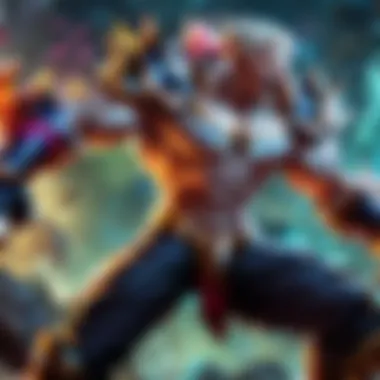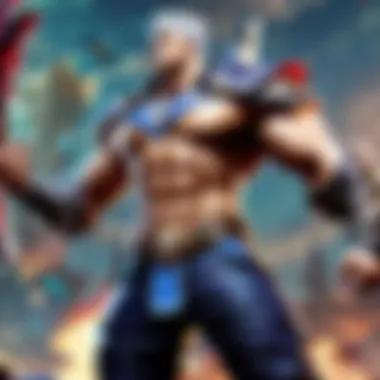Unleashing Potential: The Role of Challenger Coaching in LoL


Intro
In the highly competitive setting of League of Legends, challengers face intensifying pressure to excel. The role of coaching emerges as a critical element maximizing individual and team performance. This article examines how challenger coaching influences players, supported by specific methodologies and techniques tailored for the game. Understanding this relationship extends beyond basic gameplay; it unveils new strategies for development in both professional and amateur environments.
Champion Spotlights
New Champion Spotlight
With each update, League of Legends introduces new champions that alter gameplay dynamics. Challenger coaches analyze these releases for their potential impact within the current meta. They employ data analytics to evaluate champions’ abilities, strengths, and shortcomings. This analysis aids players in adjusting their plays, helping them navigate the evolving landscape in effective and adaptive ways.
Champion Builds and Strategies
Effective builds and strategies are central to becoming proficient in the game. Challenger coaches emphasize the importance of understanding optimal itemization for each champion. This understanding allows players to adapt their playstyle in response to the map's demands. Common considerations include:
- Champion roles: Recognizing each champion’s primary role ensures team composition effectiveness.
- Item selection: Coaches often provide insights into items that enhance champions' strengths.
- Skill order: Teaching players when to assign skill points strategically can greatly affect game outcome.
Coaches continually assess successful tactics through recorded games, adjusting these strategies as necessary to keep pace with shifting dynamics.
Gameplay Tips and Strategies
Early Game Tactics
A strong start can define the entire match. Challenger coaches stress the significance of early game tactics in gaining advantage. Central advice includes:
- Focusing on lane management: Efficient minion control allows for better resource acquisition.
- Leveraging jungle resources: Awareness of jungle camps and the enemy's positions aids in strategic plays.
Employing these tactics not only enhances early gameplay but helps built confidence as games progresses.
Team Fighting Strategies
Challenger coaching also spends considerable time optimizing team fighting strategies. Key components for success include:
- Coordination: Developing synchronized attacks between team members integrates communication skills.
- Positioning: Understanding each member's roles during fights minimizes vulnerabilities.
By reviewing past team fights, Challenger coaches analyze every move and refine approaches to win subsequent battles.
Patch Updates
Patch Notes Analysis
As the game evolves, new patches frequently introduce gameplay adjustments. Coaches meticulously review these patch notes to evaluate their effects on current strategies. This analysis ensures that players are aware of any significant changes that might impact the game directly, from champion nerfs to item modifications.
Meta Shifts
Patch updates also often usher in shifts in the game’s meta. A well-informed Challenger coach will constantly re-evaluate the strategies being applied. Players need to adapt by recognizing which champions and tactics dominate this new environment.
Community News
Esports Coverage
Additionally, Challenger coaches actively follow the esports scene. Tournaments provide critical learning opportunities. Observing professional teams gives insight into high-level strategies that aspiring players can mimic and adopt.
Community Spotlight
The broader community plays a pivotal role as well. Challanges can inspire initiatives aiding in player development. Coaches often direct players towards resources like Reddit, fostering a sense of connectiveness within the player base.
Bonus Content


Lore Exploration
Exploring the lore behind each champion can enhance a player's connection to the game. A deeper understanding allows players to visualize their role within the larger story.
Fan Creations
Lastly, League of Legends' vibrant community continually produces fan art, videos, and other creative works. These materials enrich the overall experience, encouraging creativity and enhancing player engagement.
Epilogue
Prologue to Challenger Coaching
Challenger coaching in League of Legends represents a vital aspect of player development and performance. In this ever-competitive arena, effective coaching can be the differentiator between mediocre play and true excellence. Challenger coaches possess a unique understanding of both the game and the psychological aspects of competitive play. They offer players more than just strategic insights; they provide them with mental tools and the support necessary to navigate the game's complexities.
Definition and Importance
Challenger coaching refers to the specialized guidance offered to players aiming to elevate their performance from lower tiers to the Challenger tier in League of Legends. This type of coaching focuses specifically on targeting individual weaknesses, conducting in-depth performance reviews, and designing tailored training regimes.
The importance of challenger coaching lies in its ability to adapt techniques to match the evolving game dynamics and individual player traits. Each player's learning style is different. A competent challenger coach takes this into account, enriching the training process and ensuring the most effective path toward improvement. Furthermore, a solid coaching framework can instill a sense of discipline and perseverance within players. This often leads to profound network benefits in their esports careers.
Evolution of Coaching in Esports
Esports coaching, particularly in titles like League of Legends, has evolved significantly over the years. Initially, coaching was sporadic and informal. Players often relied on self-assessment or peer feedback rather than guided insights from seasoned professionals.
However, with the explosive growth of esports and the increasing recognition of its strategic depth, dedicated coaching has become a standard in professional gameplay.
A) Early Beginnings: Coaching first emerged informally, sometimes through viewing party-style groups where players would discuss strategies.
B) Professionalization: In recent years, we have seen dedicated coaching staffs forming within esports organizations, recognizing the need for systematic development.
Today, the role of a coach has expanded, incorporating analytical tools to track player performance effectively. Metrics such as win rates, k/d/a ratios, and objective control are critically analyzed to provide constructive feedback.
With advancements in data analysis and technology, challenger coaches are now able to provide more accurate methods of support. This evolution enhances player potential, marking a shift toward a professional coaching environment that is more systematic and data-driven, essential to competing at the highest levels of League of Legends.
Understanding the Challenger Tier
Understanding the Challenger Tier is essntial for anyone looking to fully grasp the dynamic nature of coaching in League of Legends. This tier embodies the pinnacle of player skill within the game's competitive environment. It serves as a hallmark of achievement, not just for individual players, but also for teams striving to make their mark. Recognizing what the Challenger Tier entails is crucial for aspiring players as well as coaches who aim to elevate their teams’ performance.
Criteria for Challenger Status
To attain Challenger status, players must consistently demonstrate exceptional skill and game awareness. Blizzard requires that players reach a specific rank, often the top division in their competitive leagues. Key indicators typically include:
- Winning rate: Exceptional players often maintain win rates substantial beyond fify percent.
- Individual performance metrics: These can include KDA (Kill/Death/Assist) ratios, CS (Creep Score) numbers, and solo queue MMR.
- Versatility: Effective play across different roles and champions tends to sway evaluations. Coaches thrive on flexibility. They advise players to adapt strategies and champion pools regularly.
- Consistency: Challenger players need to perform reliably. Inconsistency can lead to position drops.
Achieving and maintainig Challenger rank is grueling. Those few that do, often get recognized for their accomplishments, catering them great opportunities.
Pathways to Challenging Yourself
Pursuing the Challenger rank can sometimes seem overwhelming. Various methods exist to facilitate this journey. Some pathways that can be explored include:
- Focused Practice: Uncoordinated practice can yield poor results. Strive for purposeful practice sessions where every game offers a lesson.
- Player Communities: Participation in forums or community groups on platforms such as Reddit enables mutually beneficial knowledge exchanges, allowing players to learn from others' successes and mistakes.
- Streaming and VOD Review: Watching professional streamers and reviewing self-played recorded game footage can be enlightening. Observing areas where costly errors occur often helps players adjust.
- Coaching Sessions: Engaging in training with professional coaches exposes players to industry standards of game understanding and mechanics. These experts identify weaknesses and promote improvement efficiently.
Methods and Techniques in Challenger Coaching
Challenger coaching in League of Legends requires a solid foundation of methods and practices. These approaches are vital to helping players elevate their skills. Effective coaching methods go beyond giving advice. They’engage in strategies tailored to individual player needs and the unique demands of the game.
In-Game Analysis and Review
In-game analysis stands as a cornerstone of the coaching process. This method involves watching replays of matches. Coaches dissect gameplay meticulously to identify strengths and weaknesses. Live games are assessed in real time, making it possible to give instant feedback. This level of scrutiny serves two purposes: it enhances the player’s understanding of their individual performance and informs strategies for upcoming matches.


Key aspects of effective in-game analysis include:
- Highlighting critical plays: Identifying impactful actions, whether they are successful or unsuccessful, guides future performance.
- Error recognition: Finding mistakes and learning how to avoid them helps prevent repeated failings.
- Adaptation strategies: Discussions surrounding shifts in strategy after understanding opponent patterns can dictate success in challenging matchups.
Ultimately, in-game reviews facilitate a deeper understanding of gameplay. Players build habits through consistent critique, which translates to better decision-making under pressure.
Essential Skills for a Challenger Coach
In the competitive arena of League of Legends, having a skilled coach is crucial for any team aspiring to succeed. The role of a challenger coach extends well beyond basic instruction; it involves instilling strong skills, providing targeted feedback, and enhancing tactical acumen. This section reviews several essential skills that a challenger coach must possess to maximize player potential.
Communication and Feedback
Effective communication is what separates good coaches from great ones. It forms the backbone of a productive coach-player relationship. Without clear dialogue, misunderstandings can occur, leading to poor performance in gameplay. Coaches must deliver constructive criticism while maintaining an encouraging tone. This balance fosters a healthy atmosphere for player growth.
Here are several crucial aspects of communication and feedback:
- Clarity: Coaches need to articulate strategies and expectations concisely. Miscommunication can lead to confusion and hampers team coordination.
- Active Listening: Coaches must listen to players’ perspectives. Understanding their concerns and thoughts helps address challenges specific to their gameplay.
- Regular Feedback Loops: Utilizing regular discussions on performance enhances learning. Immediate feedback is invaluable in understanding swing moments within gameplay, minimizing chances for reoccurrence of mistakes.
By focusing on effective communication, coaches lay the groundwork for long-term success and unity within the team.
Technical and Analytical Proficiency
In-depth knowledge of the game is non-negotiable for any challenger coach. This encompasses understanding champions, meta, strategies, and potential shifts in gameplay mechanics. To develop an all-around player, coaches must also be proficient in analyzing player performance.
Key elements include:
- Champion Mastery: Familiarity with each champion’s abilities, strengths, and weaknesses allows coaches to formulate tactics centered around specific character picks.
- Data Analysis: Coaching nowadays leverages analytics tools that track stats like win rates, k/d/a ratios, and ward placements. Coaches build strategies informed by wealth of data, enabling refined positional and discrete choices made in real time.
- Review Sessions: Organizations may often employ video breakdowns. Analyzing recorded matches helps identify faults outside typical engagements providing clarity on decision-making under pressure.
By enhancing their technical understanding, coaches significantly sway strategic developments, empowering players accordingly.
Adaptability and Continuous Learning
The reclamation of tactics within the realms of esports evolves at a rapid pace. What works one day may not work the next. Challenger coaches must merge their existing knowledge with an openness to learn from emerging trends.
Characteristics of successful adaptability include:
- Trend Analysis: Being informed on meta changes, patch adjustments, and observing pro matches is essential. What is trending amongst higher levels of play can provide insight into new strategies worth exploring.
- Willingness to Re-fashion: Allotting space for improvement often necessitates scrutinizing gameplay, encouraging alterations even in standardized play styles.
- Professional Development: Investing in personal growth can include educational resources, seminars, and peer reviews to learn industry-growing competencies to translate effectively onto their teams.
Encouraging coaches to embrace a mindset of continual adaptation ensures resilience in creating adept players.
In sum, challenger coaches play indispensable roles, igniting potential via communication, analytical prowess, and the adaptation to flux in this dynamic environment of League of Legends.
Impact of Coaching on Player Performance
Coaching plays a vital role in shaping player performance in League of Legends. The evolving dynamics of competitive gaming demand those involved to regularly adapt and refine their skills. Challenger coaching stands at the intersection of technical mastery and psychological support, enabling players to break through barriers they face. It cultivates an event where improvement becomes a staple, rather than a sporadic achievement.
Progression and Skill Improvement
For a player, progression is the most evident marker of successful coaching. Skilled coaches evaluate a player’s capabilities with precision and create a plan to enhance their weaknesses. Engaging in structured training sessions, players internalize new techniques and strategies. Daily practicing last hitting, understanding champion matchups, and timely map awareness are essential skills that need diligence.
Certification of progress is often illustrated through ranked achievements and tournament performances. Players who engage consistently with their coaches find improvement quicker than those acting solo.
This systematic process allows players to witness tangible growth, often reflected in higher rankings in their chosen tier. The personalized approach maintains focus on individual learning curves and nuances, ensuring that no player feels lost or driven off course.
Psychological Benefits of Coaching
Emotional resilience is a facet that might go unnoticed, yet it greatly affects a player's performance. Challenger coaches understand unique psychological pressures in high-stakes games where players can be their worst critics. A reassuring voice and constructive insight become imperative. Coaches help players develop better coping mechanics for pressure.
Such dynamic coaching can release players from an overly negative mindset. They learn to manage frustration and maintain motivation. This aspect plays out not only in pivotal matches but consistently in everyday practice. In fostering an environment of safe exploration, players become more confident in taking risks, which leads to discovering innovative playstyles.


Building a Winning Mentality
Another significant component nurtured under coaching fundamentals is the building of a winning mentality. Challenger coaches instill disciplines that evolve the team as a whole rather than focusing solely on individual gains. Competitive games require unity; neglecting this undermines potential successes.
Players learn to respect their craft and hold each other accountable. Critical moments in-game demand synergy that emerges from deep trust fostered during practice routines. Engendering a sense of collective purpose not only advances performance levels but strengthens the bond between players.
Challenges Faced by Challenger Coaches
Challenger coaches operate in a environment that is inherently complex and requires a nuanced understanding of competitive dynamics. These challenges can significantly affect the efficiency and effectiveness of coaching strategies. Addressing these obstacles is paramount not only for the development of individual players but also for ensuring cohesive team performance in high-stakes scenarios.
Navigating the Competitive Landscape
In esports, competition intensity is ever-increasing. Coaches must be aware of the rapidly evolving game meta and consistent updates. With League of Legends receiving frequent patches, understanding how these changes impact gameplay is crucial. Challenger coaches have to stay knowledgeable on champion balance, item changes, and prevailing strategies. Not doing so effectively can mean the difference between winning and losing a game. This need to stay vigilant means constantly monitoring professional leagues, scrims, and player performances.
Moreover, goal-setting plays an essential role. Coaches must guide players to set realistic but challenging objectives. Setting unrealistic expectations can lead to burnout and disappointment.
In addition, the expansion of the esports scene introduces more competitors, which raises the amount of talent coaches have to analyze and develop. In summary:
- Knowledge of game updates is crucial.
- Continuous player analysis is necessary to adjust tactics.
- Goal-setting must consider player limits and strengths.
"Success in esports coaching is more than just strategy; it's understanding human behavior within a rapidly changing landscape."
Managing Diverse Player Personalities
Player personalities vary widely and greatly impact team dynamics. Challenger coaches frequently work with individuals who carry unique emotional traits and attitude styles. For some players, motivation may come from positive reinforcement, while others might respond better to strict criticism. This diversity poses a significant challenge during training sessions and match days.
Communication is key. Challenger coaches must effectively communicate with players to understand their emotional and mental states. Misunderstandings can lead to poor performance and hinder the foundational structure of teamwork.
Additionally, coaches must facilitate a positive team atmosphere. Conflicts among players can reduce synergy and lead to greater stress levels. Embedding strong team building activities in training can mitigate this. Such activities promote collaboration and trust. Challenger coaches need to be facilitators of this environment.
In summation, navigating the varying psychological landscapes of players involves:
- Tailoring communication styles for individual preferences.
- Encouraging collaboration via team-building strategies.
- Actively managing conflicts to create a seamless interaction.
The role of challenger coaches is multifaceted, requiring a balance between technical expertise and adept interpersonal skills. Understanding these current challenges is not only important for running an effective team but also aligns strategically towards the aim of achieving continued success in the competitive setting.
The Future of Challenger Coaching
The landscape of Challenger coaching in League of Legends is rapidly evolving. As esports become more integral to mainstream culture, the expectations and methods of coaching in these high-stakes environments are also changing. Challenger coaching sits at the crucial intersection of strategies and methodologies that improve player performance while adapting to new technologies and player needs. The future promises substantial shifts that can enhance coaching effectiveness and ultimately elevate player success.
Technological Advancements in Coaching
The integration of technology into Challenger coaching has already begun reshaping the ways in which coaches interact with players. Tools such as AI analytics, streaming platforms, and advanced data visualization assist coaches in developing tailored methods of improvement. Player performance is analyzed in real time, allowing coaches to identify weaknesses and strengths with unprecedented precision.
Moreover, the use of streaming services for real-time coaching can provide instant feedback, crucial for refining skills and strategies dynamically. As these technologies develop further, the role of a coach is likely to evolve from a traditional mentor to a more data-informed strategist, making training sessions more focused and effective.
The End
Challenger coaching in League of Legends plays a critical role in improving not only individual player performance but also the overall dynamics of team play. As this article discusses, effective coaching methodologies can lead to better skill development and deeper understanding of game mechanics. These aspects can make a significant difference in highly competitive environments.
Recap of Key Insights
In summary, challenger coaching implements structured training regimens and personalized feedback mechanisms that significantly enhance a player's ability to adapt and evolve within the game. By leveraging in-game analysis, players gain insights into their performance metrics, thus understanding their strengths and weaknesses better. This analytical approach fosters a promising environment where skill enhancement is targeted and methodical.
Moreover, efficient communication and feedback form the bedrock of successful training relationships. Establishing clear channels allows players to express concerns and ask questions, thus promoting a culture of growth.
Important points to remember:
- Challenger coaching significantly impacts skill improvement and game strategies.
- Coaches bring valuable technical and analytical knowledge to help players reach their goals.
- The future of this field looks promising with technology advancements such as AI-based training tools that tailor to player needs.
Final Thoughts on Challenger Coaching
Challenger coaching is essential for aspiring and established professionals in the esports arena. This coaching goes beyond tactical improvements; it nurtures a champion's mindset and foster closer team dynamics. Players who engage with dedicated coaches develop not only gameplay techniques but also mental resilience. In a fast-paced and demanding landscape like League of Legends, this resilience can make all the difference.
Insisting on the continuous evolution of skills aligned with emerging game changes allows players to stay competitive. It is clear that features like personalized guidance and emotional support in coaching will only become more relevant. The commitment of both players and coaches to cultivating an elite gaming experience stands as a hallmark of success in the long-term professional journey.







